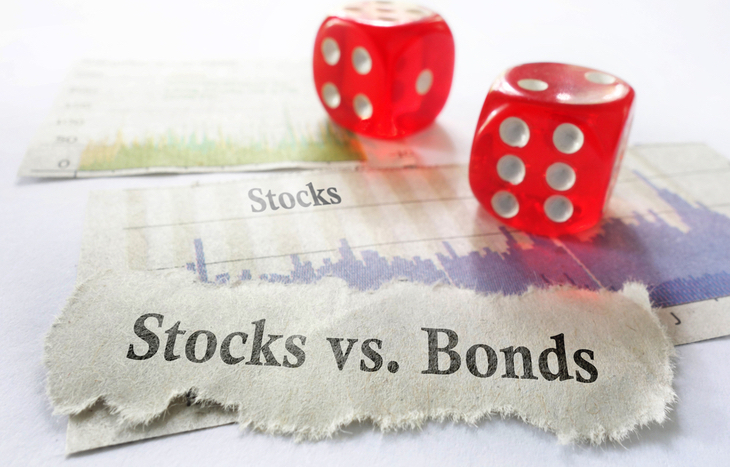There are various of us on the market saving for retirement. Some have a 401(ok) by means of their employer. Others may additionally have a Roth or a taxable funding account by means of their monetary advisor. Over time, I’ve had numerous individuals inform me, “I do not know what I’m invested in.” This text will take a more in-depth take a look at bonds vs. shares and which is best for you.
Some savers aren’t fascinated with understanding something about their investments. That’s why they rent an advisor. Then again, some are inquisitive about their investments. Though these curious of us have many questions, it may be overwhelming to determine the place to start.
In the event you fall into the curious class, I recommend beginning with the fundamentals. Most of your 401(ok) choices are mutual funds or EFTs. These mutual funds and ETFs symbolize your share in a basket of bonds and shares. Identical with the investments that you’ve along with your monetary advisor.
What’s a Bond?
Most individuals borrow cash to purchase their houses, vehicles or different issues. Corporations additionally borrow cash to run their enterprise. There are various methods for an organization to borrow cash. A technique is to problem bonds.
When an organization points a bond, it borrows cash from bondholders. The corporate guarantees to pay bondholders curiosity over the agreed-upon lifetime of the bond. On the finish of the bond’s life, the corporate guarantees to pay again the borrowed principal.
Usually, mutual funds, EFTs, or particular person traders should purchase bonds in $1,000 increments.
What’s a Inventory?
Merely put, inventory is possession in an organization. Like a bond, an organization is elevating capital to run the enterprise. The corporate sells an possession stake by promoting inventory as a substitute of borrowing cash.
The corporate could pay money to shareholders within the type of dividends. Dividends can change over time, an organization may select to eradicate or by no means pay a dividend.
Along with money dividends, a inventory can profit from a rise within the inventory’s worth. The inventory worth may lower. The long-term efficiency of the corporate usually determines the inventory worth.
Bonds vs. Shares: Which Ought to You Purchase?
Arguably, essentially the most important distinction between bonds vs. shares is their threat and return profiles. Which means there are huge variations between an investor’s fee of return and dangers concerned when investing in both bonds or shares.
Each bonds and shares threat that the corporate will exit of enterprise. In that case, any money recovered in chapter or asset sale will first go to bondholders. If the bondholders are repaid their principal and curiosity, the remainder goes to the stockholder. Usually, bondholders are usually not absolutely repaid, and stockholders share change into nugatory.
There may be sometimes much less threat when investing in bonds. The decrease threat would possible favor bondholders when the corporate does poorly.
Then again, a enterprise could do higher than anticipated. On this case, a bondholder will obtain its curiosity and principal funds on time. There is no such thing as a further profit for the corporate’s further accomplishment. Alternatively, a stockholder will profit from a rise within the inventory worth when the corporate does effectively over time.
The speed of return on the inventory would possible favor stockholders when the corporate performs effectively.
Traits of Bonds vs. Shares
Usually talking, a inventory has extra threat than a bond. The corporate’s efficiency could be laborious to estimate, and it might change over time. As well as, the stockholder’s declare on the corporate is limited to its equity. In different phrases, earnings go to pay bondholders earlier than paying stockholders.
To compensate traders for the extra threat, shares even have a a lot increased potential fee of return.
Then again, bonds usually carry decrease threat. Corporations should make their curiosity and principal funds. Even when the corporate performs poorly for some time, bondholders are prioritized over stockholders relating to the corporate’s earnings.
Bondholders settle for a decrease potential return from their funding in return for decrease threat.
Bonds vs. Shares Dangers and Inflation
Persistent inflation is a further threat to any investor. Particularly these days. For bondholders, traders obtain a hard and fast curiosity fee. Suppose inflation will increase the costs that the investor pays for on a regular basis objects. In that case, their fastened curiosity funds received’t purchase as a lot.
Inflation additionally will increase the prices of working the corporate. The associated fee will increase can scale back the corporate’s revenue, which may mirror negatively on the value of the inventory.
Slightly inflation every year is an effective factor. When inflation is simply too excessive or stays elevated for a very long time, individuals and companies can undergo.
Bonds and Shares Collectively
When contemplating bonds vs. shares, it may be troublesome deciding which one is best for you. The excellent news is you may put money into each. Many monetary advisors recommend holding a diversified portfolio of bonds and shares.
Investing in each bonds and shares can permit an investor to pinpoint the correct mix. The best mixture ensures the investor is snug with threat and potential return.
BJ Prepare dinner is a long-time inventory nerd. He has held a number of roles within the fairness analysis world and earned the appropriate to make use of the CFA designation in 2014. When he’s not writing for DailyBusiness, you will discover him trying to find new funding concepts. Exterior the funding neighborhood, BJ is a die-hard Cubs fan.

